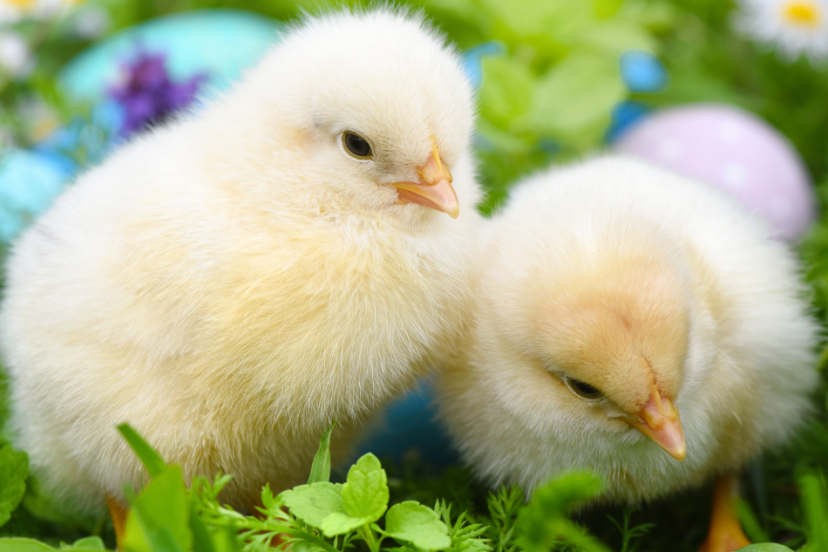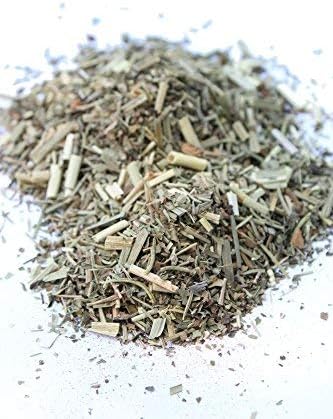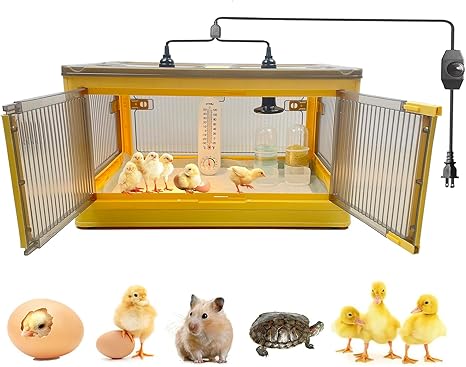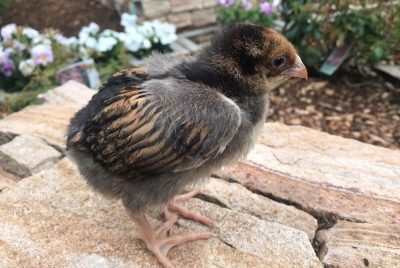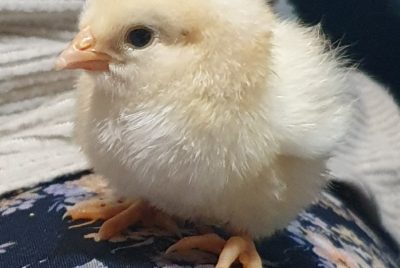How to Care for Baby Chicks – 6 Crutial Tips
Just like any young creatures, chicks under 6 weeks old require special care and attention to thrive. In this article, I will guide you through 6 crucial things on How to Care For Baby Chicks that you need to know to ensure the health and well-being of your young chicks. From proper nutrition to safe handling techniques, understanding these key points will help you raise happy and healthy chickens in their crucial early weeks of life.
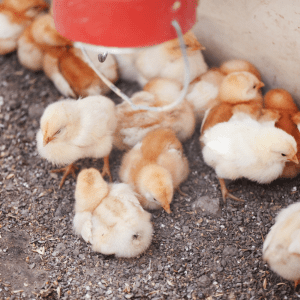
Key Takeaways on How to Care For Baby Chicks:
- Temperature Control: Chicks under 6 weeks of age require a consistently warm environment to thrive, with temperatures ranging from 90-95 degrees Fahrenheit (32 degrees Celcius) initially and decreasing by 5 degrees per week.
2. Proper Nutrition: Feed chicks a balanced diet of chick starter feed containing imperative nutrients like protein, vitamins, and minerals for optimal growth and development.
3. Hydration is Key: Ensure chicks have access to clean water at all times to prevent dehydration and promote good health.
4. Biosecurity Measures: Implement strict biosecurity practices to prevent the spread of diseases and maintain a healthy environment for your chicks.
5. Handling and Socialization: Handle chicks gently and frequently to help them become more tame and comfortable around humans, which can positively impact their behavior as they grow older.
Nutrition Essentials
How to Care For Baby Chicks – Importance of Protein
To ensure optimal growth and development, chicks under 6 weeks require a diet rich in protein. Protein is important for muscle development, feather growth, and overall health. As a young chick, your body is rapidly growing and needs a higher amount of protein compared to adult chickens. Make sure your chick starter feed contains around 18-20% protein to support healthy growth.
Vitamin and Mineral Requirements
The vitamin and mineral requirements of chicks under 6 weeks are crucial for their overall health and development. Vitamins such as Vitamin A, D, E, and K play vital roles in immune function, bone development, and vision. Minerals like calcium, phosphorus, and magnesium are important for strong bones and eggshell formation. It’s important to provide a well-balanced chick starter feed that meets all their nutritional needs.
The right balance of vitamins and minerals is necessary for chicks under 6 weeks to thrive. If they lack important nutrients, they can develop health issues like poor growth, weak bones, or feather abnormalities. Ensuring they have access to a high-quality chick starter feed will help prevent these deficiencies and support their overall well-being.
Water Quality and Availability
Proper hydration is crucial for chicks under 6 weeks to stay healthy and active. Water quality and availability play a significant role in their overall well-being. Make sure they have access to clean, fresh water at all times. Chicks can quickly become dehydrated, leading to serious health problems. Monitor their water intake daily to ensure they are drinking an adequate amount.
Dehydration can be a severe issue for young chicks, impacting their growth and development. By providing clean water in a shallow dish or waterer, you can help them stay hydrated and thrive. Regularly check the water quality and cleanliness to prevent any contamination that could harm your chicks.
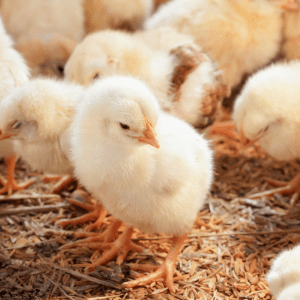
How to Care For Baby Chicks – Environmental Needs
One important aspect of caring for chicks under 6 weeks is ensuring their environmental needs are met. This includes maintaining the appropriate temperature, humidity, ventilation, and space in their living area.
Temperature Control
For temperature control, it is crucial to provide a warm and stable environment for young chicks. I recommend using a heat lamp to maintain the temperature at around 95-100 degrees Fahrenheit during the first week, then decreasing it by 5 degrees each week until reaching a stable room temperature.
| Week | Temperature (Fahrenheit) |
| 1 | 95-100 F 35-37 celcius |
| 2 | 90-95 F 32-35 celcius |
| 3 | 85-90 29-32 celcius |
Humidity and Ventilation
Humidity is also important for chicks’ respiratory health. I recommend maintaining the humidity level at around 50-65% by using a water source in the living area and regularly monitoring the levels to prevent issues like dehydration.
With ventilation, it’s important to ensure that there is enough fresh air circulating in the chicks’ space without creating drafts that can lead to chilling. Proper ventilation will help maintain air quality and prevent respiratory issues.
Space and Comfort
Ventilation plays a critical role in providing a comfortable living space for young chicks. I recommend providing at least 0.5 square feet per chick to allow for movement and prevent overcrowding, which can lead to stress and pecking behaviors.
Temperature, humidity, ventilation, and space are all interconnected aspects of creating a suitable environment for chicks under 6 weeks. By carefully monitoring and adjusting these factors, you can ensure the health and well-being of your young chicks.

How to Care For Baby Chicks – Health Monitoring
Unlike adult chickens, chicks under 6 weeks old are more susceptible to various health issues due to their developing immune systems. It is vital to monitor their health closely to ensure they are thriving and growing properly.
Signs of Illness
Illness can manifest in chicks through various symptoms, such as lethargy, huddling, ruffled feathers, decreased appetite, sneezing, coughing, and diarrhea. If you notice any of these signs in your chicks, it is crucial to isolate the sick ones immediately to prevent the spread of disease to the rest of the flock.
Common Health Issues
Common health issues seen in chicks include coccidiosis, respiratory infections, and vitamin deficiencies. These can lead to severe consequences if not addressed promptly. Coccidiosis, caused by a parasite, can be **fatal** if left untreated. Respiratory infections can quickly spread among chicks in close quarters, leading to high mortality rates. **Early detection** and **intervention** are key to managing these health issues effectively.
Issues such as **poor sanitation**, **overcrowding**, and **poor ventilation** can contribute to the development of health problems in young chicks. It is vital to **maintain a clean and comfortable living environment** for your chicks to minimize the risk of illness.
Vaccination and Medication
Health precautions such as **vaccinations** and **medications** play a vital role in preventing and treating health issues in young chicks. Consulting with a poultry veterinarian to develop a **vaccination schedule** can help protect your chicks from common diseases like Marek’s disease and Newcastle disease. Additionally, having **medications** such as antibiotics on hand can be crucial in case of outbreaks within the flock.
Medication should only be administered under the guidance of a veterinarian to ensure proper dosage and administration. **Overuse** or **improper use** of medications can lead to **antibiotic resistance** and **ineffective treatment** of diseases in your chicks. It is vital to **follow veterinary recommendations** closely when using medications to maintain the health and well-being of your flock.
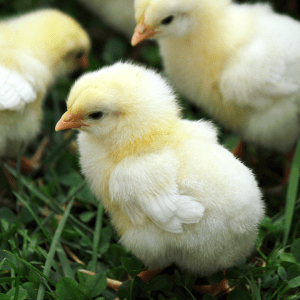
Behavioral Development
Your chicks’ behaviors in the first six weeks of their lives can give you valuable insights into their growth and well-being. Understanding their behavioral development is crucial for their overall health and happiness.
Socialization and Flock Dynamics
One of the most important aspects of behavioral development in chicks is their socialization and understanding of flock dynamics. Chicks under six weeks old are learning to interact with others in their group and establishing hierarchies.
Pecking Order and Dominance
Flock dynamics are characterized by the establishment of a pecking order, where more dominant chicks assert their authority over submissive ones. This behavior is natural and helps maintain order within the flock.
Another crucial aspect of the pecking order is the establishment of dominance. Dominant chicks will often peck at submissive ones to assert their position within the hierarchy. It’s important to monitor this behavior to ensure that no chick is being excessively bullied or harmed.
Foraging and Exploration
One of the most exciting parts of observing chicks’ behavioral development is watching them forage and explore their environment. Chicks are naturally curious and will spend hours pecking and scratching at the ground to find food.
Behavioral enrichment such as providing different types of substrate for foraging, like straw or shavings, can enhance their natural behaviors and keep them mentally stimulated. Encouraging exploration in a safe environment helps chicks learn about their surroundings and develop important skills for later in life.

Safety Precautions on How to Care For Baby Chicks
Despite the adorable and fragile appearance of chicks under 6 weeks old, it’s important to remember that they are also vulnerable to various threats. Ensuring their safety is crucial for their well-being and growth.
Predator Protection
Safety is paramount when it comes to protecting your young chicks from predators. Make sure your coop and run are secure to prevent any unwanted visitors from harming your chicks. Check for any gaps in the fencing or areas where predators could dig under to access the chicks.
Fencing and Enclosure Security
To ensure the safety of your chicks, it’s vital to have a sturdy and predator-proof enclosure. Use hardware cloth with small openings to prevent predators from reaching through or chewing the fencing. Regularly inspect the enclosure for any damages or weak spots that could compromise its security.
A secure fence and enclosure not only keeps predators out but also prevents your chicks from wandering off into dangerous areas. Make sure your fencing is tall enough to prevent any climbing predators from gaining access to the coop.
Biosecurity Measures
One of the most crucial aspects of raising chicks is maintaining biosecurity measures to prevent the spread of diseases. Practice strict hygiene by washing your hands before and after handling the chicks, as well as disinfecting any equipment or tools used in their care.
This reduces the risk of introducing harmful pathogens to your chicks, keeping them healthy and thriving. Implementing biosecurity measures not only protects your current flock but also sets a standard for future bird health management.

How to Care For Baby Chicks – Handling and Care
Gentle Handling Techniques
Not handling young chicks roughly is crucial for their well-being. I recommend always approaching chicks calmly and quietly. When picking up a chick, you should scoop them up gently, supporting their body with both hands. Avoid grabbing them hastily or squeezing too tightly, as this can cause stress and even injury.
Stress Reduction Methods
An important aspect of caring for chicks is reducing stress in their environment. One effective way to achieve this is by creating a quiet and peaceful setting for the chicks. Loud noises, sudden movements, and overcrowding can all lead to stress in young chicks. Providing a clean and comfortable living space with access to fresh water and food is also vital for their well-being.
One additional method to reduce stress in chicks is to give them plenty of space to move around and explore. Crowded conditions can lead to aggression and stress-related behaviors. By giving chicks adequate space to roam and interact with their environment, you can help promote their physical and mental health.
Beak Trimming and Grooming
Methods such as gentle beak trimming may be necessary for some chicks, particularly in cases where they exhibit aggressive pecking behaviors. If you notice chicks pecking excessively at each other or themselves, it may be necessary to trim their beaks to prevent injury. However, it is important to seek guidance from a professional when considering this procedure, as improper beak trimming can lead to complications.
Final Words on – How to Care For Baby Chicks
On the whole, raising chicks under 6 weeks of age requires careful attention and dedication to ensure their health and well-being. By understanding the importance of proper nutrition, heat, space, handling, and health monitoring, you can successfully raise healthy and happy chicks. Remember to always be attentive to their needs and provide them with a safe and comfortable environment to thrive.
It’s important to continue learning and improving your practices when it comes to raising chicks and other animals on your farm.

FAQ’s about How to Care For Baby Chicks
Q: What do baby chicks eat?
A: Baby chicks under 6 weeks old should be fed a diet of chick starter feed, which provides them with the necessary nutrients for healthy growth.
Q: Do baby chicks need heat?
A: Yes, baby chicks require a heat source to maintain their body temperature as they are not able to regulate it effectively on their own. A heat lamp or brooder is important for keeping them warm.
Q: How often should I clean the brooder for baby chicks?
A: It is recommended to clean the brooder daily to remove any droppings, spilled feed, and soiled bedding. This will help maintain a clean and healthy environment for the chicks.
Q: Can baby chicks be kept with adult chickens?
A: It is not advisable to keep baby chicks with adult chickens initially, as they may be at risk of being bullied or injured. It is best to introduce them gradually once they are older and able to defend themselves.
Q: How can I tell if a baby chick is sick?
A: Signs of illness in baby chicks include lethargy, loss of appetite, huddling, sneezing, or unusual droppings. If you notice any of these symptoms, it is important to consult a veterinarian to ensure the health and well-being of your chicks.

